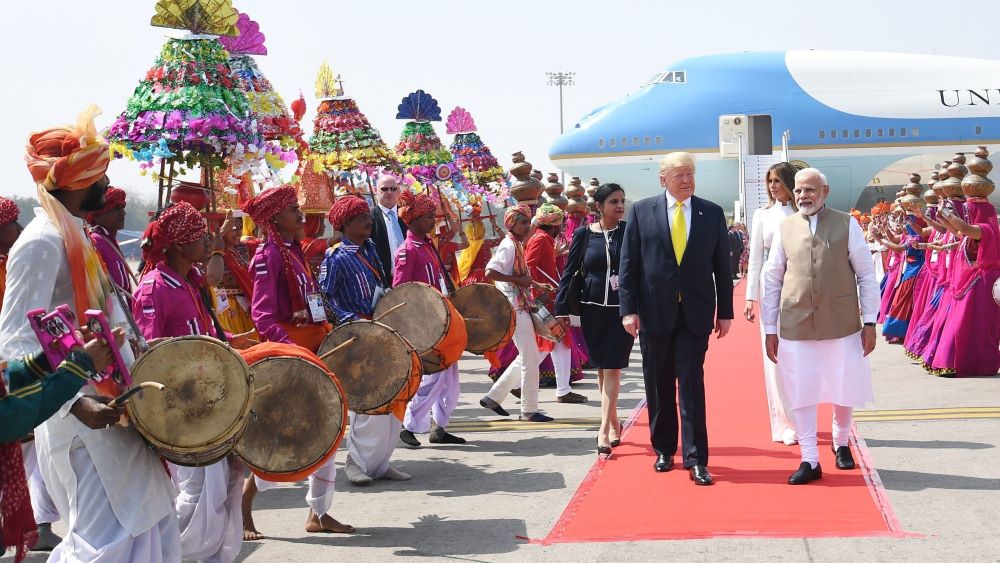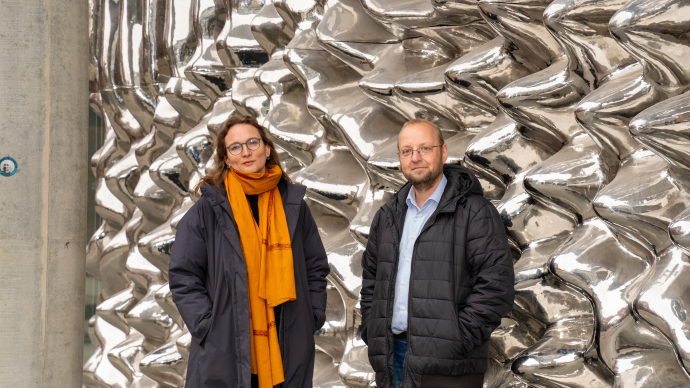There is an election in India, which, with its over 1.3 billion inhabitants, is now the most populous country in the world. Many indications suggest that the incumbent Prime Minister Modi - also known as India's Trump - will be reelected. Why is that? And what is at stake?

Two populists: India's "Trump" Narendra Modi is visited by the real Donald Trump, during his presidency. Photo: NTB/Scanpix.
This article is translated from Norwegian to English by UiOGPT
Narendra Modi, who leads the Hindu nationalist party BJP, also known as the Indian People's Party, has been Prime Minister for ten years. Experts on India believe that he is very likely to be reelected. At the same time, many fear that Modi will take India in a more undemocratic direction.
"If Modi gets an overwhelming election victory, I'm afraid he will interpret it as a mandate to implement structural changes without paying much attention to the fact that there is actually significant opposition in the country," says Francesca Refsum Jensenius.
She is a Professor of Political Science with India as her research field.
Another India researcher, Kenneth Bo Nielsen, Associate Professor of Anthropology, agrees:
"There is a risk that Modi will interpret a new large mandate as carte blanche to accelerate the political development in an increasingly antidemocratic direction."
India - the biggest election
Nevertheless, both Nielsen and Jensenius hope that the world's largest democracy will live up to its history as a country that engages large parts of the population in central political issues.
"When India had its first national election in 1951, it was called a great experiment," says Jensenius.
She explains that many believed that democracy was not possible in a country with such a large, poor population where a significant portion of the electorate is illiterate.
"And at every election, we say that this is the largest election in world history. It's a record each time. It's huge and it's intense, and it's always impressive how such a large population is mobilized," says Jensenius.
"I hope there will be a public debate about what India should and will be doing in the coming years," says Nielsen.
India experts are these days paying extra close attention to what happens in India. The election starts on April 19th and runs until June 1st. A huge machinery is required to give the nearly one billion eligible voters over 18 years of age a chance to cast their votes. The election takes place in seven phases across India's 543 constituencies. In the recent elections, 66-67 percent of the eligible voters have exercised their voting rights, a turnout that, according to Jensenius and Nielsen, is relatively high.

The wealthy and the poor in Modi's India
India is a country of many contrasts. It has experienced strong economic growth, yet inequality is increasing.
"Even though many have been lifted out of poverty, there are still millions living just above the poverty line, while others are incredibly rich and among the world's wealthiest," emphasizes Francesca Refsum Jensenius, who points out that India is a key country if one is concerned with sustainability.
If you are interested in reducing poverty, in equality, in environmental protection, in women's health, in equal rights for children, India is an extremely important player. The list is long, says the political scientist.
"India, with its inhabitants, represents one-sixth of the world's population, so the development in the country should obviously be of interest to us. Not least should the way marginalized groups are treated be of concern to us. If one cares about the position of liberal democracy on a global scale, one should start with India," says Kenneth Bo Nielsen.
This text is based on an episode of Universitetsplassen - a research-based podcast from the University of Oslo. Political scientist Francesca Refsum Jensenius and anthropologist Kenneth Bo Nielsen discuss why we in Norway and the world should care about the election in the world's largest country. Perhaps India's Trump - Prime Minister Narendra Modi should interest us more than the American presidential candidate?
They also talk about the role of women in India, about religious minorities, and about the caste system.
Despite increasing inequalities in India, Narendra Modi is an extremely popular Prime Minister. He is the parliamentary leader for the BJP, which leads a coalition with many smaller parties.
"Charisma is the most frequent explanation for his popularity. Modi has a special ability, both rhetorically and in a personal way, to make direct contact with Indians, almost regardless of their background," says Kenneth Bo Nielsen.
The expert on India believes that Modi far surpasses America's Trump in populism.
"Modi has been involved in political life since the 70s and has been experimenting with his own style of populism since 2000. Like Trump, he is a polarizing populist, but he reaches segments of the Indian population in a completely different way than Trump does on his home turf. Modi exemplifies the modern form of populism in an iconic way," says Nielsen.
Francesca Refsum Jensenius agrees:
"If you take a basic definition of populism, namely to be one of the people who go against traditional elites, then Modi is a far more convincing populist than Trump," says Jensenius.
She points to a story the current Indian Prime Minister often falls back on from his own childhood. He talks about when he sold tea at the train station. Modi also often repeats that he is of low caste and has never been near elite institutions like Harvard.
"Trump is probably more associated with money and women," says Jensenius, who believes that Modi's project is to build an "image" as an ascetic and a good Hindu, as a servant of the people or a "watchman," which he also often calls himself.
The Gandhi dynasty is history
Many associate India's political life with the Congress Party and with various members of the Gandhi family. Rahul Gandhi is perhaps the most prominent opposition politician in the upcoming election, but neither he nor the opposition is getting much attention.
"The Congress Party is still to a certain extent a power factor. Yet, we almost forget to talk about them. That probably reflects both the media image and the political discussion," says Jensenius.
She notes that the Congress Party was the dominant party traditionally but has not made headway in recent decades. And even though Rahul Gandhi still represents the dynasty tradition, he does not have the same appeal as Modi. It is Modi who gets most of the attention.
Kenneth Bo Nielsen believes that much of Modi's popularity also has to do with his setting an agenda that involves being proud of being Indian. "Make India great again," as Trump's slogan for the USA also goes.
"For Modi, being Indian is primarily about being Hindu, in addition to charting a course for India's emerging global greatness and position. He promotes a new pride in being part of an emerging, successful nation," says Nielsen.
Both he and Jensenius believe that this "Make India great again" project to some extent overshadows themes like traditional "bread and butter" issues - things that fill the everyday lives of people.
"In India, it is often said that what voters want is more public goods - electricity, roads, and water. And in surveys, most voters now say that what they are most concerned about is development and jobs," tells Jensenius.
But in the political debate around national elections, the greatness idea about India seems to trump most other issues, according to the India scholars. Additionally, voters are concerned about efficiency and anti-corruption, which Modi also speaks warmly of.
Suppressing the opposition and critics
However, Modi has not proven himself to be a good proponent of open political dialogue.
According to recent reports, there is an increasing degree of censorship. The opposition is, according to Nielsen, scrutinized by the courts for old sins, which are then conspicuously dropped if those same politicians switch party allegiance and join Modi's BJP.
Traditionally, the political debate in India has been active and vigorous. But in recent times, many of the major media houses have been bought up by businesses associated with the BJP. These same media houses are positive towards the current government, while there are no longer any media houses that are similarly loyal to the opposition.
"More and more journalists report that there is no longer room to write things that are negative about the regime, and that the opposition is not given space in the media," says Jensenius.
"What makes a Prime Minister, who is so popular, resort to suppressing the opposition?"
"That's a very good question. In fact, one of the things I hope will happen in India, if the BJP and Modi win the election, is that they become confident enough to open up for a healthy, democratic debate," Jensenius says.
She believes it is important for a country's development that critical voices are heard and not prevented from contributing to building in a positive direction by hindering opposition, media, and academia.
On the other hand, Bo-Nielsen believes there is a cultural mission in the way the BJP governs and the narrative often promoted by Modi.
"It's about the perception that India's history with hundreds of years under first Muslim and then British dominion has created a sort of slave mentality among many Indians, who wrongly look up to the West's way of doing things."
Creating enemy images of muslims and christians
Kenneth Bo-Nielsen points out that Modi's central idea is that Indian thought can provide alternative political solutions and an alternative system of knowledge.
"So for Modi, it's not just about suppression to win elections. It's a cultural project," emphasizes the anthropologist.
This project has been tough on the religious minorities: the Muslims and Christians - in a country where 80 percent of the population identifies as Hindu.
"From the Hindu nationalist perspective, these two groups are seen as so-called non-Indian minorities. As outsiders, religions that don't naturally belong in South Asia," says Nielsen.
He mentions that both Muslims and Christians are used in Hindu nationalist construction of enemy images. About Muslims, it is often said that they aim to take over India and that their hidden agenda is the Islamization of India. About Christians, it is said that they have a hidden agenda tied to Western imperialism.
"It's worth noting that India was officially formed as a secular state in contrast to Pakistan, which was not. Many are now concerned that the secular foundation is being increasingly weakened under BJP's rule," says Francesca Refsum Jensenius.






